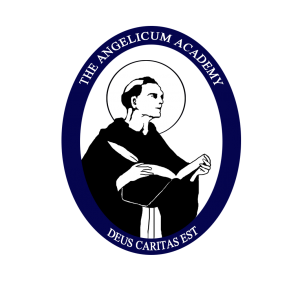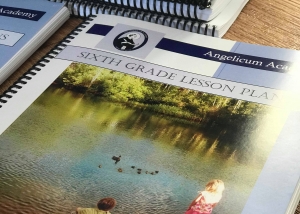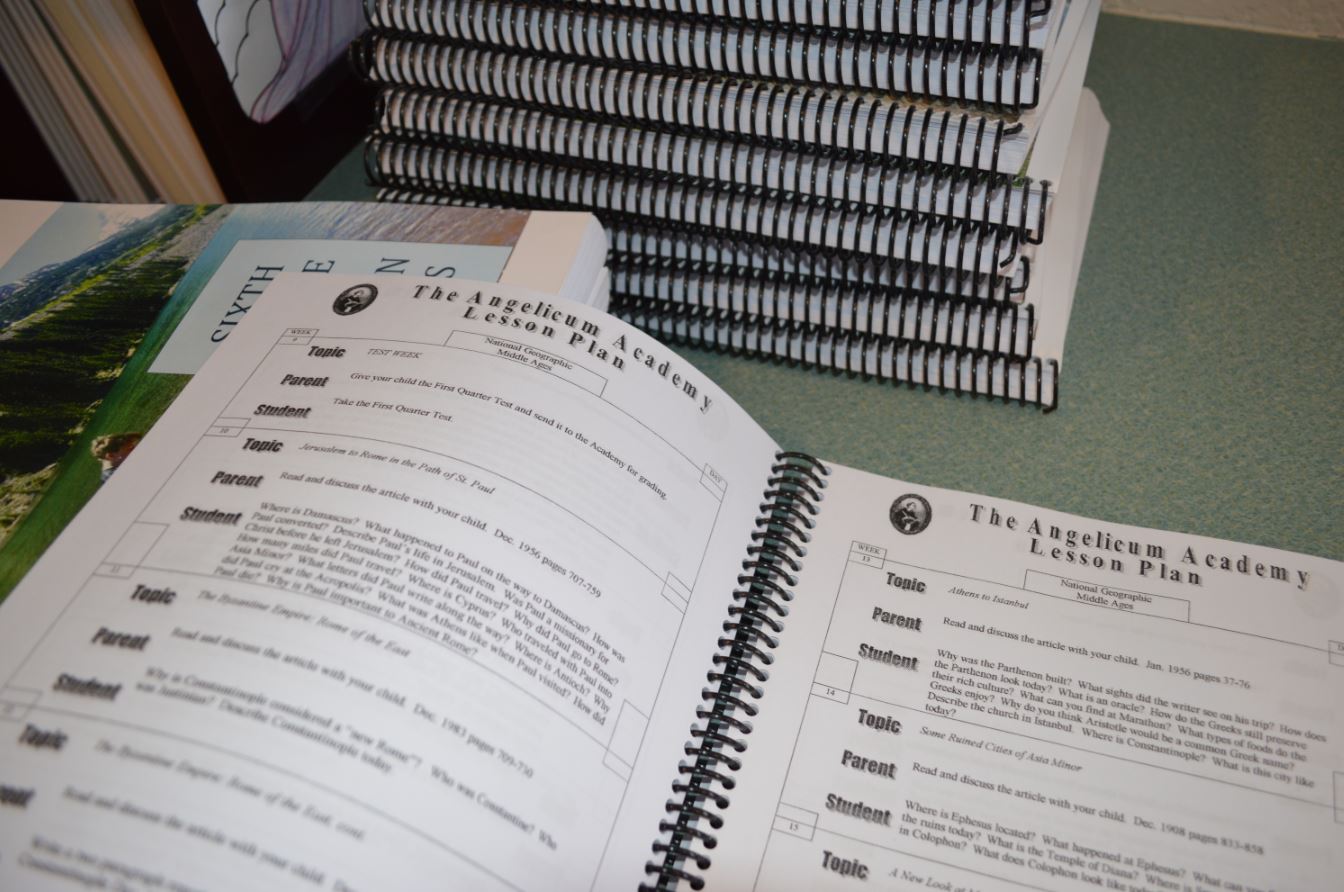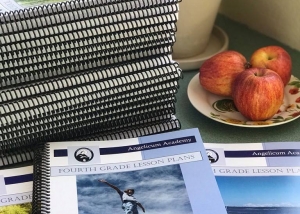Questions?
We’ve got answers! Please click on any one of the five Q&A categories below.
Unsatisfied with the homeschooling curricula available in the 1990’s – we researched the various educational methods and approaches, as well as educational goals. Again and again we were drawn back to the Great Books Movement – the return to the classics – as the core element needing restoration and recommended by the leading lights for educational reform, including Mortimer Adler, former Editor of Encyclopaedia Britannica and the Great Books of Western Civilization (as well as author of 50+ other books). After meeting with Dr. Adler for three days in 1999 and again in 2000, we concluded his educational approach was the most insightful and profound, and, with his encouragement, introduced the Great Books movement online, to homeschoolers and others. We accepted our first students in 2000 A.D. Dr. Adler – long a Thomist since reading the Summa Theologica when he was 22, was received into the Catholic Church in December, 2000 by the Most Reverend Pierre DuMaines, then bishop of San Jose, CA, a friend and admirer of Dr. Adler. In order to prepare students to read the Great Books, we introduced Dr. John Senior’s children’s classics Good Books list into the elementary levels. Literature is the backbone and main integrating factor in education and in our program.
We have assembled what we believe is the finest educational curriculum available. Our high school and college-level literature program – the Great Books Program– introduces students to approximately 120 of the greatest works of genius ever produced, in various fields. The list may be viewed elsewhere, but includes Homer, Plato, Virgil, Genesis, St. John, St. Augustine, Venerable Bede, St. Thomas Aquinas, Dante, Chaucer, Shakespeare, Cervantes, Dickens, Dostoevsky, Flannery O’Connor, etc. There cannot be a better core to any curriculum, at least with respect to the materials used, by the common opinion of the ages.
Such great works can more easily be understood with some preparation. Hence we developed our Good Books Program of literature classics for younger, elementary school readers (designed to be accompanied by Lives of the Saints). Likewise, our language arts, history, art, writing, vocabulary and other courses are all aimed and arranged to prepare students for the best – the great books. As the reader may see, the entire program, from pre-school to the end, is organized for excellence – to lead students to the very best – in art, science, literature, history, etc. – in graduated steps in all areas. Nearly 20 years of experience (following 80 years of the Great Books movement) have confirmed this approach.
Yes, there are a number of articles on this website. Additionally, Classical Homeschooling online magazine has numerous articles and essays discussing all of the above in detail. In addition, there is extensive literature and numerous articles on the Great Books movement online. Links to this above.
Our curriculum is all listed under the tab “Curriculum,” so simply visit any grade level, or subject area (such as Math, Art, History), and select the levels and materials you wish to use. To enroll just click the ENROLL link at the top of the homepage. To order individual books for non-enrolled students, please visit our Academy Bookstore, which only carries books and materials we recommend for our curriculum, listed by grade level, and by subject area. Parents are free to utilize other educational programs for various courses, alongside our program, even substituting for parts of our program – however we do not provide grading for other programs as we do not have their answer keys and it is not efficient to attempt to do. However, we do add such courses to our enrolled students’ trancripts, on request (we simply need some sufficient evidence of the name of the course, successful completion and grade or level attained to do so – this is usually a transcript, but that is not required).
We have found that many parents want to cover additional subjects, in other areas. We offer 12 subjects – too many to do at one time. So, most parents begin with 3 or 4 and then add more until they are covering the areas they wish. Many teach some of the subjects 3 or 4 days a week, other subjects, only one day a week. Some focus on one subject at a time – like the unit studies approach. Whatever suits your time and circumstances is best for you. We trust the judgment of parents, and in validation of that view: homeschoolers regularly outperform schooled (public or private) students.
That is a matter of opinion of course, but we believe religion, literature, English language arts (such as phonics, grammar, writing), math, art (and/or music), history, and by 7th grade – science, are all very important subjects. Geography, philosophy for children, foreign languages, and dialectics (aka Socratic discussions) are also important. None should be entirely neglected. That is why some parents rotate weeks, or do some subjects only one day a week, or some over the summer, etc. There are all kinds of options for home education, which avoids the one-size-fits-all blunder of mass education.
Only until the students can read for themselves. Before then, they are often read to the children before bedtime. But once they can read, they typically read in the evening by themselves. No doubt this varies a great deal as well. Our Good Books literature program begins at the nursery level, though 8th grade (15 levels in all). It is followed by our Great Books Program, beginning in 9th grade and up.
The natural sciences are learned analytically in the traditional sequence of biology, chemistry, physics – usually sometime in 9th-12th grades. Texts are available to prepare for those years – in a simplified format for 6th-8th grades – entitled Life, Earth and Physical science (or similar names). These are important subjects. However, these texts all assume a certain level of experience of the natural world. Students who do not actually know what a butterfly does, who have not seen turtles in water, blown seed stars off of dandelions, made mud pies nor followed rabbits to their holes, simply cannot do as well as students that have. Texts have been created for 1st-6th grade science – and we carry the very best for parents who want them – but on examination, parents will discover their contents are largely attempts to replicate the experiences mentioned above, using photos and dry explanations, and which are enjoyed by all children with enough time to play in nature.
The earlier the better – and the easier. Studies show that learning a foreign language is more difficult after puberty. But better late than never. We offer the classical languages – ancient Greek and Latin – and encourage the study of those inflected, root languages, but any foreign language is far better than none. A good understanding of English is nearly always one happy result of learning a foreign language and its grammar and syntax.
No. Again, parents are the primary educators. We are here to aid them. While we believe our materials are the finest available we understand that in some circumstances parents may wish to continue using some materials they already have or prefer for some other reason. Of course we cannot grade tests for other curricula as we do not have their materials and answer keys. We are happy to add those courses to your Angelicum transcript – just send us the relevant information at your leisure.
The listings are a rough guide for parents. Certainly, in the youngest grades, the parents will be doing some, or most, of the reading. This is not only acceptable but also beneficial for the students, even for some older students, as they learn how the language should sound and also helps the student learn to listen well. It is a good thing for students [for all of us, in fact] occasionally to read a book that is difficult and makes them stretch intellectually. It is for this reason that some of the books are listed where they will be a challenge to the student. Of course, not every book should be difficult as this would be discouraging. In any case, the parents know best what the student is capable of, and the choice of books is up to them. St. Benedict’s advice regarding novices was: not too hard, lest they be discouraged, nor too easy, lest they be bored. This varies students to student.
The amount of time will, of course, vary from student to student and family to family, but, on average elementary level, homeschool students spend only about 2 to 3 hours a day studying (excluding reading literature) and still surpass students in schools. But if you wish your students to excel in life, we believe it takes more time than that to do well. But no precise number is valid for all. Nevertheless, double that time or even more would not be unreasonable in some cases. It obviously depends on a number of factors: available time; educational goals; grade level, number of courses, temperament, other obligations, etc.
The Jesuits discovered long ago that students do not like doing the same learning activity more than two times in a row. So they broke it up with contests, field trips, other subjects (such a perhaps geography or history), different approaches, etc. Some homeschooling parents make Wednesdays a different sort of day, leaving Mondays and Tuesdays, and then Thursdays and Fridays, for the routine classes, but thus only two times in a row. But family life often solves this problem in unexpected ways!
The Academy allows parents to pick and choose whatever courses they wish, from whatever levels they wish. We believe this is a parental right, and duty. We do not believe every student should take every course we offer, neither all the time nor every year. There is a give-and-take in education, that is highly individualized, which is why it is called a co-operative art by Aristotle, like medicine and animal husbandry. If a doctor gave all sick folks the same remedy for every illness, many would die needlessly. Likewise, if a farmer gave all animals the same food, or the same quantity – many would needlessly grow sick. Education too has a large element that is best left to the parents who know and love the individual student best and can best judge when their child is either bored (i.e., not challenged enough), or discouraged (i.e., challenged too much), and can then adjust their studies accordingly.
It is natural to love to learn. Most parents are in the best position in the early years to cultivate and nurture this desire. Schools can too easily stifle this by one-size-fits-all approaches to education, killing the innate desire to learn, by forgetting that education is a co-operative art. This is one of several great advantages homeschooling offers. A loving, safe (emotionally, morally, and physically) learning environment is another, in the great majority of cases.
Some students love math and blaze through three or even four grade levels in one year, while making little to no progress in, say, reading or writing; for others it is the reverse. These areas of interest tend to shift in time, so that by the end of elementary school level (with just a little gentle pushing) all, or nearly all, of the courses have been studied through the 8th grade level. If not, there remains time to make up for missed ground in the high school period. We have had high school students take 3rd or 4th grade English/grammar as they simply have not studied or been taught this in school, at least not adequately. They typically make up for lost time very rapidly. The only deadline we have – outside of those for live classes – is that the students need to have all their high school level work done by the time they wish to conclude 12th grade (and their high school and required college-level courses done by the time they wish to earn their Associate’s degree).
Home education allows for different paces in each course, and in each level. We encourage parents not to fell bound to the school academic year for all the courses – rather, they should feel free to proceed faster with some courses, and slower in others, and even have their children doing different grade levels in different courses. For example, A 5th grade math student might be doing 6th grade grammar and 4th grade literature (Good Books), each at a different pace (such as one lesson per day in one course, 2 in another, or perhaps one per week in a third). Such an individualized approach, dome reasonably well, helps students avoid both boredom and discouragement, and allows them time to master the subject matter. St. Thomas advised students not to proceed to the next level of a subject until they had mastered the level they were on, and that will certainly differ student to student, course to course, and level to level. This logical, individualized approach is next to impossible to accomplish or provide in mass education settings, such as schools.
The Academy offers a 20% tuition discount for siblings after the first student is enrolled, as long as two or more siblings are enrolled. The “first student” is defined as the one with the highest total tuition (usually the oldest sibling student).
For example, if two siblings are enrolled in the Academy home school program (which is $250 for grades 1-12), the first student would be $250, the next sibling student(s) would be $200, each. A sibling enrolled in the Great Books program – any of the three tracks of it (high school, college or A.A track) – would entitle siblings enrolled in the Great Books program in any track, or the Greats Honors Program, Homeschool Program or any enrichment class, to the family discount. The “first” student would be the one with the highest in the highest total tuition.
A sibling enrolled in the Great Books program – any of the three tracks of it (high school, college or A.A track) – would entitle siblings in the Great Books to the family discount, in any track. The “first” student would be the one in the highest tuition track.
Please feel free to call or email if you still have any questions about our generous family discount.
We have one other FAQ page, relating specifically to our Associates (A.A.) degree track HERE.
Our banner has various tabs for more details on the various topics tabbed there, particularly about the Great Books Program. For our refund and other policies, go HERE.
This program is about education, not about forcing parents or students to conform to our programs, views or rules. We respect parental authority over the education of their children., even if we happen to disagree or think we may know better. We are simply here to help and assist them, make suggestions and educational recommendations, to whatever degree they wish and we are able. We are anti-bureaucratic – if we can say “yes” to any parental request, schedule or proposal, we do so. We are not taxpayer-funded, so we do not have to bow to political correctness or fads of social experimentation in order to receive government money with strings attached. Children are not “creatures of the State,” they are, rather, children of God, and of their parents to whom He has entrusted their care and education. This is an unapologetically Catholic program, however students of all faiths, or no faith, are welcome to benefit from our services, and many have done so over the years, and are treated with dignity, kindness and respect. We have had students of every major religion and denomination, from six continents and many nations – all are welcome.
Some teaching is done by lectures (didactically), other by conversation or discussion (dialectically). Dialectics refers to the latter – discussion or conversation. “Socratic” refers to the ancient Greek philosopher – Socrates – who loved to use conversations and mutual inquiry as his primary method to teach and learn, just as most of us do most of the time when we are learning something new.
As we all know, giving or attending a lecture is a very different thing from participating in a conversation. The skills involved are different. Dialectics used to be taught in American schools, but the only remnants left now are found in the occasional debate class, or rarer still – a logic class. The Academy has resurrected Dialectics and Socratic Logic, for homeschooling – per the advice of Dr. Adler and others – as a weekly online discussion classes available for 3rd to 8th grade, and in the Great Books Program. Students from around the world discuss the books and important ideas in the books they read, together, in an often exhilarating experience of mutual inquiry and friendly conversation, moderated by our online faculty. There is much more about this on our website at the Great Books Program.
Grade Levels. Socratic Discussions are offered 3rd-8th grade online classes (which meet every week online, for 40 minutes to 1 hour depending on the grade level); Great Books discussions are the high school and college level online discussions (which meet weekly for two hours, September through May). The readings for the Socratic Discussions are short (1-3 pages), pithy texts from the classics; the readings for the Great Books discussions are the Great Books themselves or very substantial excerpts.
Our live, Socratic Discussion classes occasionally use short excerpts from our Good Books and Great Books lists, but also many other short readings. It is not a whole book discussion class, as the Great Books classes are. The object is to teach the liberal art of dialectics (speaking and listening, about a text, logically, not reading per se, though of course these is a little reading involved.
All year long. But online classes begin only in the first week of September. Late students are sometimes accepted, depending on circumstances, classes and dates involved. The early enrollment discount begins each year on April 1. Prior to April 1 we sometimes do not have the class times for the following Fall semester posted. We encourage enrollment in April, or as early as parents have reached a decision, so that they reserve the online class time(s) that is most convenient for them. When an online class fills, we do close enrollment in such classes, and may or may not add more at other times. Once enrolled, the class time selected is reserved for that student. These may be changed, provided other classes are not full.
Students in 3rd through 8th grades may join an online seminar group at any time, September through May. The readings that provide the basis for those discussions are not sequential – meaning that knowledge of the previous readings is not necessary for full participation in the current discussions.
Because the high school and college Great Books reading/seminar program is a four-year course, with successive readings building upon the knowledge and understanding acquired during the previous readings and seminars, students normally start at the beginning of the Ancient Greek year, regardless of the age or grade level of the student. Once a class is full, new students may enroll in another class time, and may request (by email to us) to be put on a waiting list for their preferred time. We let them know, in order, if an opening occurs, which is fairly common after a few weeks due to normal attrition or other changes.
The discussions are conducted over the Internet, with live audio, so the students participate through their home computers (using a WiFi connection, as do PCs and Macs) using a simple $15-20 microphone and speakers. Headphones often help if the student is attending from a location with frequent interruptions or noise.
No. The online class is “live” audio. Using the software is simple. Even our youngest students have no trouble with it.
Our software is supported on most of the operating systems and devices. To attend a live online session you can use one of the following devices:
Laptop or desktop computers running Windows. This includes Windows XP, Windows Vista, Windows 7, Windows 8 and Windows 10.
All Apple computers running MAC OS 10.8 and above.
All Android based tablets or phones running an Android version 4 and above.
All iOS devices – iPhone, iPad and iPod.
The Great Books largely re-integrate into one course what was so laboriously divided (dis-integrated) and taught separately in elementary grades. Analysis and synthesis are both necessary in a complete education. The Great Books run the gamut of subjects from theology (e.g. St. Thomas Aquinas), the language arts (e.g. Homer, Virgil, Shakespeare) and science (e.g., Copernicus, Einstein) to geography (Ptolemy), philosophy (Socrates, Plato, Aristotle), cartography and history (Herodotus, Thucydides), social studies (e.g., Herodotus, Gallic Wars, Freud), and even math (Euclid, Nicomachus of Gerasa). It is possible to break the Great Books courses down into some of these areas for separate grades, if a state so requires. We have done so HERE.
Yes. Each level of Great Books class meets only once a week. However, as there are, for example, four Greek classes, it is possible to switch from one Greek class to the other if you wish or if circumstances make that desirable, for one week, or more, since the readings are the same (except when holidays result in a one week variation on occasion). The classes are also recorded and may be listened to that way as well.
Yes. Since the readings are chronologically sequential, and the Greeks are foundational, the ideal way to take the entire course is first Greeks, then Romans the next year, etc., over four years. However, we do have students taking more than one level at a time. Usually they do Greeks and Romans, then the next year they do the Middle Ages and Moderns. So while for most students we recommend doing one level a year to maximize the order of discovery approach, since each Great Book does stand-alone (part of what makes them great), we do allow students to take whatever levels they wish. We encourage the study of the great classics of Western civilization, so if someone is fired up to do more than 30 great books a year, more power to them.
The Greek Year is simply the first year of the Great Books Program. We allow 9th graders/14-year-olds to take the course, which is why it is listed at 9th grade, but it could be listed at any grade above 9th as well. After nearly two decades fr doing so, at the advice of Dr. Adler, we can confirm that 9th graders can do the course even though it has been recommended for college-level credit by the American Council for Education (ACE CREDIT). Our oldest students was 87. We have had numerous students in the higher high schools grades, college students and adults take the same courses. The faculty are generally professors or experts in the books being read. We have two moderators per class, with rare exceptions. The books themselves are timeless and ageless, containing material and questions that challenge students-thinkers of all ages. No doubt the older students tend to get more out of the books, and classes, but every student profits from sharing the thoughts of the greatest sages of mankind. So we encourage every student to begin with the Greek Year.
Yes, at any semester or shortly after the semester begins. Any payments received will be applied to the appropriate track selected. Students who switch from the high school track to the college track or Associates degree (A.A.). track may also do the missed extra work of the latter and submit it for credit.
Yes. We are also happy to incorporate earlier work or grades from other programs onto our transcripts for enrolled students. Because our students enroll at many various times during the year, we prepare and send transcripts, report cards, certificates – whatever is needed – upon request. This service is free for enrolled students.
We recommend – but it is up to you as the primary educator – completion of these high school levels: religion (4 years); math (4 years, ideally through the introductory calculus, but certainly through Algebra I, II and Geometry); 3 years of science: biology, chemistry and physics; 4 years of English Composition; at least 2 years of any foreign language (we recommend Latin and Classical/Attic Greek first) to acquire the ability to read, write (and hopefully speak and listen) any single foreign language with reasonable (not perfect) proficiency and fluency; and the 4-year, Great Books online discussion groups (which incorporates four years of social sciences and English); 2 years of Art (Art in Focus – our 6th-8th grade book is fine for this); Ethics(anytime 7th-12th grade – we offer this live, online); and learning a musical instrument or our Enjoyment of Music CDs.
The foregoing assumes earlier completion of elementary level (through 8th grade level) religion, language arts courses (such as English, writing, vocabulary, our Good Books literature or similar), some education in music and the arts, and, to a lesser extent (perhaps 1 day per week on average) philosophy for children, history, geography and perhaps cartography. Students may take our free placement tests to determine at what level(s) they need to begin with our materials. It is not unusual for students to be strong in one course – such as math – and weak in another – such as English. In that case, they may not need to take any elementary level math with us, but may need to begin English studies in a lower grade level in order to catch up in that area.
Please note that some states require various courses we do not offer in order to qualify one for a high school diploma from a public high or charter school; some even require homeschoolers to take certain courses we may not offer (such as the history of that particular state or a particular “social studies” course [which is often, sadly, the modern replacement for much of history]). Nearly all colleges and universities now accept homeschool transcripts of high school completion, even if certain state requirements are not included, particularly if you are applying to an out-of-state college. If you know which colleges you are interested in attending, we suggest you contact those college admissions offices years in advance of application and find out exactly what will be expected of you. This may necessitate adding a course(s) to our curriculum which we do not offer.
Many home schooled students do not particularly desire a diploma to evidence completion of high school studies. However, for those who do, to receive a Graduation diploma (High School) from the Angelicum Academy, a student must have completed the following 9th-12th grade level courses (or substantial equivalents):
- 4 Years of Religion or Theology
- 4 Years of English Language Arts (e.g., Grammar and Usage, Composition, College Essay Writing, Critical Reading, Rhetoric)
- 3 Years of Math (Algebra I & II and Geometry; note: the ACT also tests Trigonometry; the SAT tests data analysis, statistics and probability, but we do not require these)
- 3 Years of Science (normally consisting of : Biology, Chemistry, Physics, but sometimes Astronomy or other science courses)
- 3 Years of Social Studies (any of the following: History, Ethics, Civics, Socratic Logic, Geography, Economics)
17 Total (see just below for courses covered by the Great Books Program)
Note: Some States also require, 2 Years of Foreign Language (Ancient Greek or Latin are recommended, but any foreign language qualifies) and some require 1 Year of Art or Music (Art History –e.g. , Art in Focus or Instrumental or Vocal Music lessons are also recommended). We do not require these.
Our 4-Year Great Books Program is both the core of our educational approach, and “the backbone of a liberal education.” This interdisciplinary program, which studies 120 great works of Western civilization over four years/8 semesters includes great works of literature, history, philosophy, theology, poetry, political science, social science and psychology. Consequently, it includes the substantial equivalent of four years of English language arts courses, and three years of social studies, inter alia. It includes much more as well, but students who take this program do not need to take additional English language arts courses (assuming they completed 8th grade grammar) or social science courses to fulfill our graduation requirements. They are of course free to do so – and we do offer such courses – but for them it is not required.
[In more detail: the Great Books courses include much Ancient History, World History, US History, US State Papers/Civics, Western Civilization, World Literature, English Literature, American Literature, Poetry, Shakespeare, Ancient Philosophy, Political Science, Psychology, Vocabulary. See HS credit chart
No. The word “Angelicum” is a reference to the informal nickname for what is now called the Pontifical University of St. Thomas Aquinas in the City (“in urbe” – meaning Rome), aka PUST. We chose the name Angelicum (or Angelicvm since Latin has no u) for our academy for two reasons: 1.) as a mark of esteem and affection for that Dominican university in Rome, renowned for its attachment to orthodoxy and the teachings of St. Thomas Aquinas, and, 2.) because the name itself actually refers back to the “Angelic Doctor”, St. Thomas Aquinas whose image appears on our logo. Attachment and devotion to St. Thomas Aquinas has long been a mark of attachment to the orthodox Catholic faith and respect for the numerous Popes who have urged students, teachers, philosophers and theologians to study the works of St. Thomas, as we do.
Yes. Anyone may purchase any of the materials in the Academy bookstore.
Yes. You may choose as many or as few courses as you wish, from whatever grade levels you wish, for any student. You may also mix grade levels (e.g., 5th grade math; 4th grade English; 6th grade history). We encourage parents to individualize the courses and paces selected for their students. So at enrollment pick a main grade for lesson plans, then let us know if you wish to depart from that “main grade” level for individual subjects , and we will send lesson plans for those subjects, without charge, as long as the student is enrolled.
No. You may buy each of the books, from any grade level(s), individually. Again, the parents make such decisions – we merely suggest or recommend.
Yes. You may choose whatever books you wish from any grade level for any student. Remember, it is home education – you are the Principal. We are here to help, with advice, materials, guides, etc.
If you are unsure, simply use our placement tests online. We also allow parents to move their students up a grade (or more) or back, in any subject, whenever they think that advisable. That is a parental decision we respect. We dislike bureaucracies, and try hard not to become one, to the contrary. Whenever possible, our answer to parental questions such as: “Can we do such and such in educating our child?” is “Yes, it’s your decision as the parent.”
To build a stronger foundation for your child’s education, the Angelicum Academy offers enrollment at any time of the year. We grade and record all quarterly tests and book report forms for enrolled students. We test on your schedule – we have no deadlines you have to meet. You may send the tests to us at any time of the year. Tests are included in our Lesson Plans, and may be taken when students reach them in their studies. Sending them in for grading is optional and free for enrolled students.
Parents have repeatedly told us that our Grading Services have been invaluable for the insightful comments, praise for work well done, suggestions for improvement where needed, and the consistent cycle of testing quarterly. Parents often need an outside source for their children, especially as the children get into their teen years, to help keep the school year on track. Our grading services include offering comments and suggestions on all papers and tests sent to us. We grade all of the quarterly tests for your student. We send the tests back to you. If you have any questions about our grading service, please email the registrar, Dr. Elisabeth Carmack, at: info@angelicum.net – we will be happy to answer your questions.
No. Except for the optional, live online classes, which obviously have to have regularly scheduled class times to meet, there are no deadlines nor time limits in this program. Again, this is home education for home schoolers – not a school per se. To impose deadlines is both unnecessary and arbitrary. Some students complete a whole year’s work in a class in a month – others take two years in some. The parents are the primary educators – after the students themselves – not us.
We provide “quarterly” tests in the Lesson Plans, but how long you choose to take to complete a “quarter” is up to you. One of the benefits of homeschooling is the scheduling flexibility it offers. Our Lesson Plans divide the courses into four sections of approximately nine weeks each (36 weeks per grade level). However, you are free to go through the course material as quickly or as slowly as you wish. They are not dated. We send the tests to you with the Lesson Plans.
Three Easy Steps to Homeschooling:
1. Enroll
Flip for DetailsEnrollment
Includes:
Lesson plans, the literature guide, grading, and transcript maintenance.
Yearly Tuition:
$55 for grades N-K and $250 for grades 3-12
2. Order Your Books
Flip for DetailsOrder Your Books
Books can be purchased in the Academy Bookstore for your convenience, or elsewhere. You can pick and choose which subjects you want to take and need only purchase the books required for those subjects. Core courses include: math, science, literature, language arts, religion, and history.
3. Enroll in Online Classes (Optional)
Flip for DetailsOnline Classes (Optional)
Online enrichment classes are open to students grades 3-12, and typically meet once per week. We offer a variety of different subjects, and all classes have a maximum enrollment total of 15 students. Our online classes provide a lively, social community that includes a student blog, clubs, and more.POPULAR LINKS FOR ANGELICUM PARENTS
DAILY LESSON PLANS
Daily, easy-to-use lesson plans for all grade levels.
SAMPLE DAILY SCHEDULES
Sample daily schedules from Angelicum parents.
HOMESCHOOL PROGRAM
Angelicum is a complete, Catholic homeschool program.
GOOD BOOKS PROGRAM
We offer Good Books Literature guides for nursery through 8th grades.








